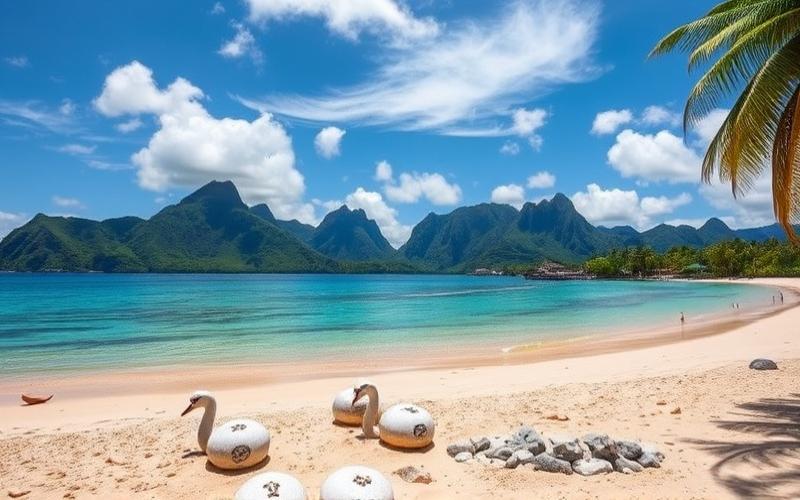
 Published on and written by Cyril Jarnias
Published on and written by Cyril Jarnias
Understanding the consumer market in Vanuatu is essential for any business looking to establish or expand operations in this South Pacific archipelago. With a population of approximately 300,000 spread across 83 islands, Vanuatu offers a unique and evolving market. Despite its small size, the country enjoys stable economic growth and is increasingly attracting attention from foreign investors. In this article, we will explore various aspects of Vanuatu’s consumer market, from purchasing habits to emerging trends, including competitive analysis and growth prospects.
Consumer Habits in Vanuatu: Between Tradition and Modernity
Consumer habits in Vanuatu are strongly influenced by traditional Melanesian culture and colonial heritage. However, with the country’s increasing openness to the outside world and rising purchasing power, a gradual evolution in purchasing behavior is being observed.
Food consumption remains largely dominated by local products. Ni-Vanuatu (Vanuatu residents) place great importance on fresh, locally grown foods such as tubers (taro, yam), tropical fruits, and seafood. Nevertheless, there is growing demand for imported products, particularly in urban areas like the capital, Port-Vila. Supermarkets and convenience stores are gaining popularity, offering a wider selection of international products.
In non-food sectors, consumption habits are rapidly evolving. Increasing access to the internet and smartphones is transforming consumer purchasing and information-gathering methods. According to World Bank data, internet penetration in Vanuatu rose from 11% in 2010 to over 25% in 2023, opening new opportunities for e-commerce and digital marketing.
The tourism sector also plays a significant role in the evolution of consumption habits. With over 300,000 visitors annually before the COVID-19 pandemic, tourism contributed to the introduction of new products and services, influencing local consumer tastes and expectations.
Good to know:
Consumer habits in Vanuatu are undergoing significant change, blending local traditions with modern influences. Businesses must adapt their offerings to meet this market duality.
Market Segmentation: Effectively Targeting Ni-Vanuatu Consumers
To succeed in Vanuatu’s market, it is crucial to understand population segmentation and adapt strategies accordingly. Several key segments can be identified:
1. Urban vs. Rural Population
Approximately 25% of the population lives in urban areas, mainly in Port-Vila and Luganville. These urban consumers generally have higher purchasing power and are more open to modern products and services. They are also more likely to use digital technologies for their purchases.
In contrast, the rural population, which represents the majority of residents, remains more attached to traditional consumption patterns. They prefer local products and informal distribution channels.
2. Young Consumers
Vanuatu has a young population, with a median age of about 22. This more educated and connected generation represents a crucial segment for businesses. They are more inclined to adopt new trends and technologies and are particularly responsive to brands that support social and environmental causes.
3. Expatriates and Tourists
Although not a significant portion of the permanent population, expatriates and tourists constitute a segment with high purchasing power. They often seek international quality products and services, creating demand for imported goods and premium experiences.
4. Emerging Middle Classes
With the country’s economic growth, a middle class is gradually emerging, particularly in urban areas. This segment seeks a balance between quality and price and shows growing interest in branded products and modern services.
To effectively target these different segments, businesses must adopt a differentiated marketing approach. For example, reaching rural consumers may require leveraging traditional distribution networks and community leaders. For urban youth, a strategy focused on digital and social media will be more relevant.
Good to know:
Market segmentation in Vanuatu reveals diverse opportunities for businesses. A targeted strategy that considers the specificities of each segment is essential for success in this developing market.
Competitive Analysis: An Evolving Landscape
The competitive landscape in Vanuatu is characterized by a mix of well-established local players and international companies seeking to enter this growing market. Understanding this dynamic is crucial for any business looking to establish itself in the country.
Dominant Local Players
In many sectors, local companies continue to dominate the market. For example, in retail, chains like Au Bon Marché and LCM Supermarket are major players. These companies benefit from strong recognition among local consumers and a good understanding of market specificities.
In the banking sector, the National Bank of Vanuatu plays a predominant role, especially in rural areas where it is often the only financial institution present. This local presence gives it a significant competitive advantage.
Arrival of International Players
However, there is a growing presence of international companies attracted by Vanuatu’s growth potential. In the telecommunications sector, for example, Digicel, a Jamaican company, has established itself as a major player alongside the historical operator Telecom Vanuatu Limited.
In tourism, international hotel chains like Hilton and Holiday Inn have entered the market, bringing international standards and a global clientele.
Emerging Niches and Opportunities
Vanuatu’s market also offers interesting opportunities in specific niches. For example, in the renewable energy sector, companies like UNELCO Engie are developing innovative projects to meet the energy needs of isolated islands.
E-commerce, although still in its early stages, represents another promising area. Local platforms like Vanuatu Marketplace are beginning to emerge, offering new opportunities for small businesses and local artisans.
Competitive Challenges
Companies wishing to enter Vanuatu’s market must be aware of certain competitive challenges:
- The limited market size can make it difficult to achieve economies of scale.
- High logistics costs, due to the country’s island nature, can impact price competitiveness.
- Consumer loyalty to local brands and businesses can create barriers to entry for new players.
To succeed in this competitive environment, companies must adopt a flexible and innovative approach. Collaborating with local partners, adapting products and services to specific market needs, and investing in building a strong brand image are strategies that can prove successful.
Good to know:
The competitive landscape in Vanuatu is rapidly evolving, with a mix of established local players and emerging international companies. Opportunities exist for businesses capable of adapting to market specificities and bringing unique added value.
Current Trends: A Market in Transformation
Vanuatu’s consumer market is currently undergoing rapid transformation, influenced by various economic, social, and technological factors. Understanding these trends is crucial for businesses wishing to position themselves effectively in this evolving market.
1. The Rise of Digital
The growing adoption of digital technologies is rapidly transforming consumer habits in Vanuatu. According to International Telecommunication Union data, smartphone penetration increased from 20% in 2015 to over 45% in 2023. This evolution opens new opportunities for e-commerce and digital services.
Social media, particularly Facebook, plays an increasingly important role in consumer purchasing decisions. Local and international businesses use these platforms to promote their products and services, creating new communication channels with consumers.
2. Environmental Awareness
As an island nation particularly vulnerable to the effects of climate change, Vanuatu is seeing strong environmental awareness emerge among its consumers. This trend translates into growing demand for eco-friendly and sustainable products and services.
For example, the 2018 ban on single-use plastic bags encouraged the use of eco-friendly alternatives. Companies that highlight their sustainable practices and environmentally friendly products are increasingly appreciated by Ni-Vanuatu consumers.
3. The Rise of “Made in Vanuatu”
There is growing pride in local products, fueled by a desire to support the national economy and preserve cultural identity. This trend is particularly evident in the food sector, with increased demand for local agricultural products and traditional culinary specialties.
The Vanuatu government actively supports this trend through initiatives like “Vanuatu Made,” which aims to promote locally manufactured products. Companies that successfully integrate elements of local culture and traditions into their offerings are likely to benefit from this trend.
4. The Search for Convenience
With increasing urbanization and evolving lifestyles, Ni-Vanuatu consumers, particularly in urban areas, are increasingly seeking convenience in their purchases. This translates into growing demand for home delivery services, mobile payment options, and ready-to-consume products.
Companies like Vanuatu Post have responded to this trend by launching home delivery services, while mobile payment applications like M-Vatu are gaining popularity.
5. Tourism’s Influence on Local Consumption
Although the tourism sector was heavily impacted by the COVID-19 pandemic, its influence on local consumption habits remains significant. Products and services initially intended for tourists are increasingly adopted by the local population, particularly in urban and tourist areas.
This trend is evident in various areas, from gastronomy to leisure, creating opportunities for businesses capable of adapting their offerings to satisfy both tourists and local consumers.
Good to know:
Current trends in Vanuatu’s consumer market reflect a unique blend of modernity and traditions. Successful businesses are those that manage to adapt to these trends while respecting local cultural values and specificities.
Growth Forecasts: A Promising Future Despite Challenges
Analysis of economic prospects and consumption trends in Vanuatu suggests a promising future for the consumer market, despite some persistent challenges. Here is an overview of growth forecasts and factors that will influence the market in the coming years.
Economic Growth and Purchasing Power
According to World Bank projections, Vanuatu’s economy is expected to experience average growth of 3.5% per year during the 2024-2028 period. This growth, although moderate, should translate into a gradual increase in household purchasing power, thereby stimulating consumption.
The tourism sector, a pillar of Vanuatu’s economy, is expected to play a key role in this growth. With the post-pandemic recovery, visitor numbers are expected to return to and exceed pre-COVID levels by 2026, generating positive spillover effects throughout the economy and stimulating demand for goods and services.
Demographic Evolution and Urbanization
Vanuatu is experiencing sustained population growth, with an annual growth rate of approximately 2.2%. This demographic dynamic, combined with increasing urbanization, is expected to boost demand for consumer goods, particularly in urban centers like Port-Vila and Luganville.
By 2030, it is estimated that nearly 30% of Vanuatu’s population will live in urban areas, compared to about 25% currently. This urbanization trend should favor the emergence of an urban middle class, creating new opportunities for businesses in sectors such as food, clothing, consumer electronics, and services.
Infrastructure Development
The Vanuatu government, with support from international partners, has launched several major infrastructure projects expected to positively impact the consumer market. These projects include improvements to port, road, and airport infrastructure, as well as expansion of the telecommunications network.
These investments should facilitate the distribution of consumer goods, reduce logistics costs, and improve market access for businesses, while stimulating overall economic growth.
Challenges and Risks
Despite these positive prospects, Vanuatu’s consumer market faces several challenges:
- Vulnerability to natural disasters, particularly tropical cyclones, which can disrupt economic activity and the supply chain.
- Dependence on imports for many consumer goods, making the market sensitive to exchange rate fluctuations and global price changes.
- Persistent inequalities between urban and rural areas, which can limit market growth in certain regions.
High-Potential Sectors
Some sectors are expected to experience particularly strong growth in the coming years:
- Information and communication technologies, with growing demand for smartphones, internet services, and mobile applications.
- Health and wellness-related products and services, reflecting increasing awareness of the importance of a healthy lifestyle.
- Renewable energy and eco-friendly products, in line with the country’s sustainable development goals.
- The education and training sector, driven by a young population seeking skills for the modern job market.
Good to know:
Growth forecasts for Vanuatu’s consumer market are generally positive, driven by stable economic growth, increasing urbanization, and infrastructure investments. However, businesses must remain attentive to specific market challenges and adapt their strategies accordingly.
Conclusion: A Market of Opportunities for Visionary Businesses
Vanuatu’s consumer market offers considerable potential for businesses capable of navigating its unique environment. With a young and growing population, a developing economy, and increasing openness to international influences, Vanuatu presents numerous opportunities for innovative and adaptable businesses.
To succeed in this market, businesses must adopt a nuanced approach, taking into account cultural specificities, logistical challenges, and emerging trends. Innovation, sustainability, and community engagement will be key success factors in the coming years.
Whether you are a local business seeking to expand or an international company aiming to penetrate this growing market, a thorough understanding of Vanuatu’s consumer market dynamics is essential. By staying attuned to the needs and aspirations of Ni-Vanuatu consumers, adapting to local conditions, and bringing real added value, businesses can seize the unique opportunities offered by this evolving island market.
Disclaimer: The information provided on this website is for informational purposes only and does not constitute financial, legal, or professional advice. We encourage you to consult qualified experts before making any investment, real estate, or expatriation decisions. Although we strive to maintain up-to-date and accurate information, we do not guarantee the completeness, accuracy, or timeliness of the proposed content. As investment and expatriation involve risks, we disclaim any liability for potential losses or damages arising from the use of this site. Your use of this site confirms your acceptance of these terms and your understanding of the associated risks.

















